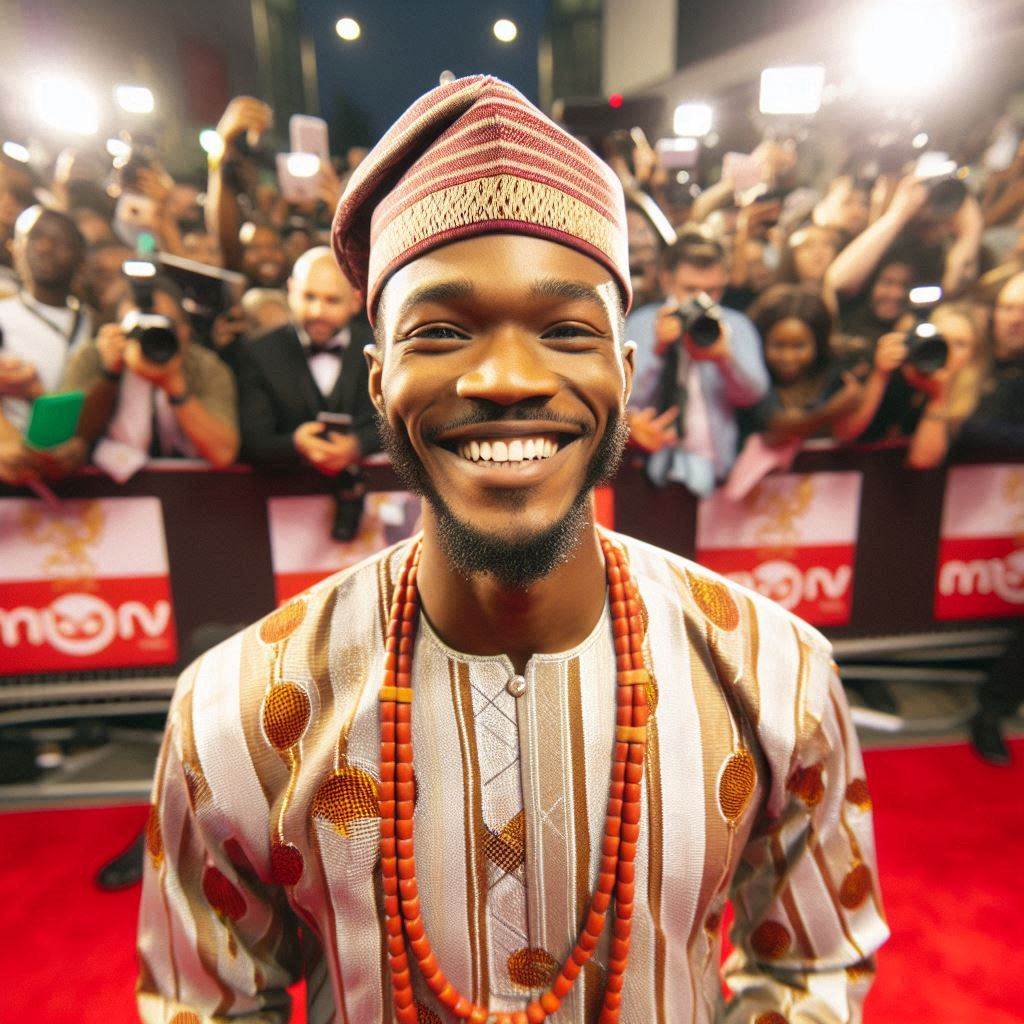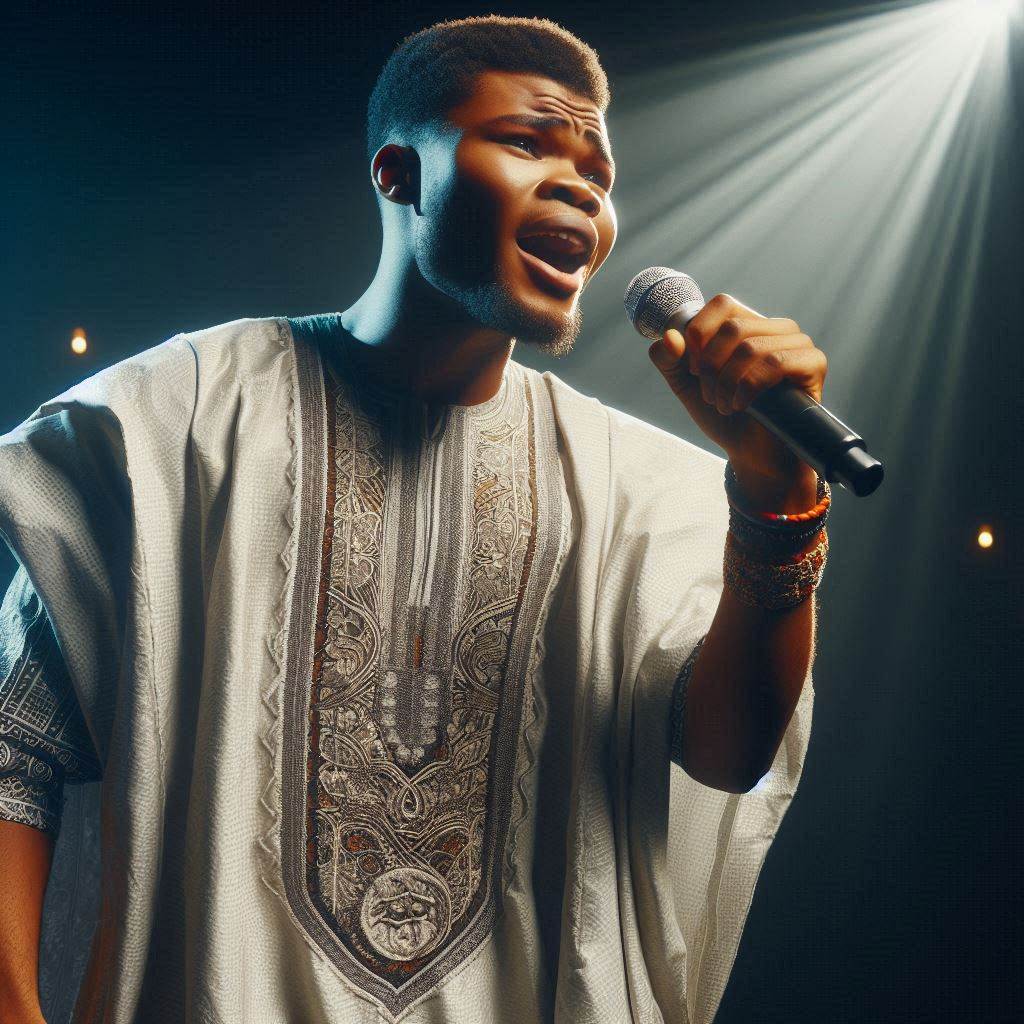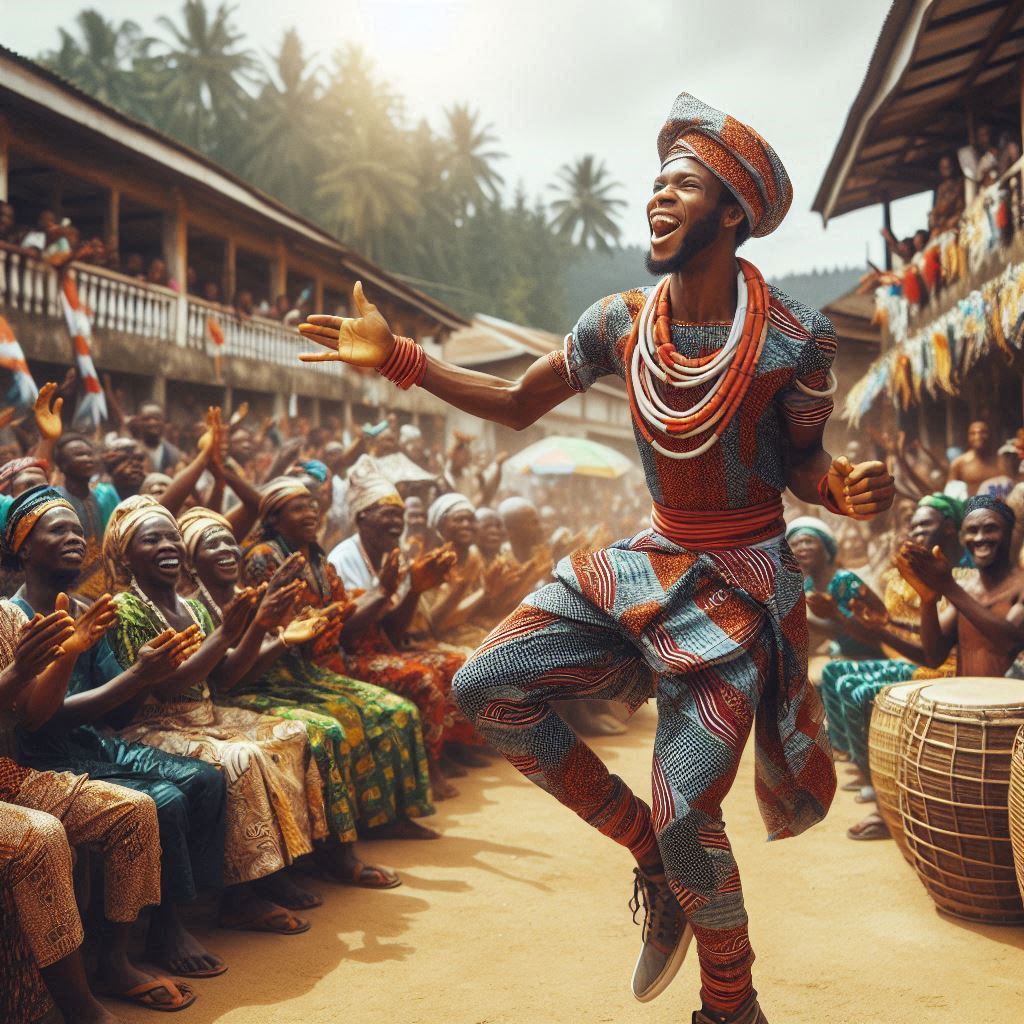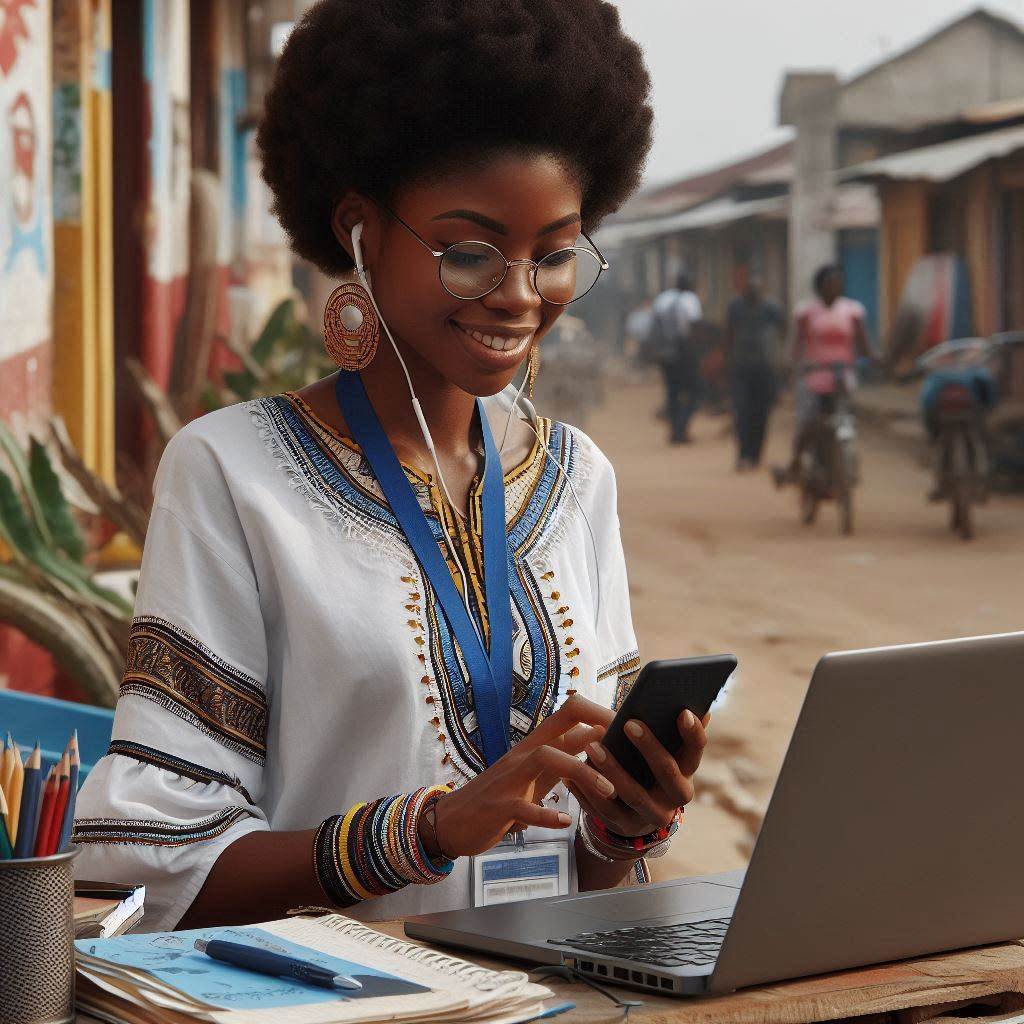Introduction
Nigeria, a country rich in culture and heritage, boasts a vibrant tapestry of traditional dance forms. These dances are not merely performances but embodiments of history, community, and identity.
Brief Overview of Traditional Dance Forms in Nigeria
Nigeria’s traditional dance forms are as diverse as its people, reflecting the country’s vast cultural landscape.
From the rhythmic beats of the Yoruba tribe’s Bata dance to the energetic movements of the Igbo people’s Ekpe dance, each dance form tells a unique story.
The Hausa people’s Bori dance, characterized by its graceful movements and colorful costumes, celebrates spiritual rituals and rites of passage.
In contrast, the Tiv tribe’s Swange dance is a lively and expressive performance often accompanied by melodious tunes from traditional instruments like the flute and drums.
Importance of Traditional Dance in Nigerian Culture
Traditional dance holds a sacred place in Nigerian culture, serving as a means of preserving heritage, passing down ancestral knowledge, and fostering community bonds.
Through dance, Nigerians connect with their roots, expressing emotions, beliefs, and values that have been cherished for generations.
In many Nigerian communities, traditional dances are integral to ceremonies and celebrations, such as weddings, festivals, and religious rituals.
These dances serve not only as entertainment but also as a form of cultural expression, uniting people in joyous celebration or solemn reverence.
Moreover, traditional dance serves as a vehicle for storytelling, conveying narratives of triumph, love, sorrow, and resilience.
Through intricate choreography and symbolic gestures, dancers communicate themes of unity, identity, and spirituality, transcending language barriers and communicating profound messages to audiences.
Purpose of the Blog Post
This blog post aims to shed light on the richness and significance of traditional dance forms in Nigeria.
By exploring the diversity of Nigerian dances and their cultural importance, readers will gain a deeper appreciation for the country’s heritage and the role of dance in shaping its identity.
Through engaging descriptions and insights, this post seeks to inspire curiosity and appreciation for Nigerian culture while fostering cross-cultural understanding.
Whether you are a dance enthusiast, a cultural aficionado, or simply curious about the world, join us on a journey into the captivating world of Nigerian traditional dance.
History of traditional dance in Nigeria
Traditional dance in Nigeria has a rich history that dates back centuries. It is an integral part of the country’s cultural heritage and plays a significant role in showcasing the diversity and vibrancy of Nigerian culture.
Origin of traditional dance forms in different regions of Nigeria
Nigeria is home to over 250 ethnic groups, each with its unique traditional dance forms.
These dances are often passed down from generation to generation and are rooted in the history,
beliefs, and practices of the various ethnic communities.
In the northern region of Nigeria, traditional dances like the “Goruba” and “Kakaki” are popular among the Hausa and Fulani ethnic groups.
These dances are characterized by rhythmic drumming, vibrant costumes, and synchronized movements that reflect the cultural traditions of the region.
In the western region, the Yoruba ethnic group is known for its energetic and acrobatic traditional dances such as the “Bata” and “Sakara.”
These dances are often performed at weddings, festivals, and other cultural events to celebrate important milestones in the community.
The eastern region of Nigeria is home to the Igbo ethnic group,
known for their colorful and expressive traditional dances like the “Ekombi” and “Agbacha Ekurunwa.”
These dances are accompanied by live music,
storytelling, and intricate dance routines that convey the history and values of the Igbo people.
Evolution of traditional dance through the years
Over the years, traditional dance in Nigeria has evolved to incorporate modern influences while still preserving its cultural authenticity.
Younger generations have embraced traditional dance as a way to connect with their heritage and express themselves creatively.
Traditional dance troupes and cultural organizations have played a crucial role in promoting and preserving traditional dance forms in Nigeria.
These groups travel both nationally and internationally to showcase Nigerian traditional dance to a global audience,
fostering cultural exchange and appreciation.
Influence of culture and religion on traditional dance
Traditionally, dance in Nigeria was closely tied to cultural and religious practices.
Many traditional dances were performed as part of rituals,
ceremonies, and festivals to honor deities, ancestors, or mark significant events in the community.
With the spread of Christianity and Islam in Nigeria,
traditional dance has undergone some changes to adapt to the changing religious landscape.
However, many traditional dances continue to be performed as a way to preserve cultural identity and promote unity among different ethnic groups.
Despite these influences, traditional dance remains an essential aspect of Nigerian culture,
connecting people across generations and preserving the rich history and traditions of the country.
Read: Psychological Impact of COVID-19 on Nigerians
Popular traditional dance forms in Nigeria
Nigeria, a land of vibrant cultural diversity, boasts an array of traditional dance forms that reflect its rich heritage and storied history.
From the lively rhythms of Ekombi to the intricate footwork of Bata and the spirited movements of Nkwa,
each dance form offers a captivating glimpse into the nation’s cultural mosaic.
Ekombi: A Celebration of Joy and Unity
Ekombi, originating from the Efik people of the Cross River State,
is a jubilant dance form characterized by its energetic movements and rhythmic drumming.
Participants, adorned in colorful attire, sway and spin to the pulsating beat, expressing joy and camaraderie.
Bata: The Dance of the Yoruba Tradition
Bata dance, hailing from the Yoruba ethnic group, is renowned for its intricate footwork and elaborate drumming patterns. Dancers, clad in traditional attire, move gracefully in sync with the hypnotic rhythm, showcasing skill and agility.
Nkwa: A Cultural Extravaganza from the Igbo People
Nkwa, a traditional dance of the Igbo people, is a spirited display of cultural pride and identity.
Dancers adorned with vibrant costumes perform intricate choreography, accompanied by lively music and chants, embodying the essence of Igbo heritage.
Unique Features and Characteristics
Each traditional dance form in Nigeria possesses unique features that distinguish it from others. Ekombi’s dynamic movements symbolize unity and celebration, while Bata’s intricate footwork showcases precision and skill.
Nkwa, with its vibrant costumes and spirited choreography, embodies the cultural richness of the Igbo people.
Regional Variations
While certain dance forms like Ekombi and Bata are practiced across Nigeria,
regional variations add depth and diversity to traditional dance styles.
For example, Ekombi may have variations in the Cross River State compared to other regions,
each reflecting local customs and traditions.
Similarly, Bata dance may exhibit differences in style and technique depending on the Yoruba community practicing it.
Preserving Nigeria’s Cultural Heritage Through Dance
In a rapidly changing world, traditional dance forms serve as a vital link to Nigeria’s cultural heritage,
preserving age-old traditions for future generations.
Through performances, workshops, and cultural festivals,
efforts are underway to ensure that these invaluable expressions of identity and belonging continue to thrive.
In fact, From the vibrant rhythms of Ekombi to the intricate footwork of Bata and the spirited movements of Nkwa,
Nigeria’s traditional dance forms captivate and inspire.
With their unique features, regional variations, and cultural significance,
these dances serve as powerful symbols of the nation’s rich and diverse cultural tapestry, celebrating unity amidst diversity.
Read: Psychology and Counseling Services in Nigerian Schools
Cultural significance of traditional dance
Traditional dance in Nigeria holds immense cultural significance as it serves as a means of preserving the cultural heritage and traditions of various ethnic groups.
These dance forms are deeply rooted in the history and beliefs of the people, reflecting their customs, rituals, and social norms.
Moreover, traditional dance plays a crucial role in promoting unity and solidarity among community members, fostering a sense of belonging and shared identity.
Role of traditional dance in storytelling and passing down cultural heritage
Traditional dance serves as a powerful tool for storytelling, as it enables the transmission of history, myths, and legends from one generation to another.
Through intricate movements, costumes, and music, dancers convey narratives that depict the struggles, triumphs, and traditions of their ancestors.
In this way, traditional dance becomes a means of preserving the cultural heritage and ensuring that the stories and values of the past are not forgotten.
Connection between traditional dance and community celebrations and rituals
Traditional dance is an integral part of community celebrations and rituals in Nigeria, serving as a form of expression and communication during important events.
Whether it is a harvest festival, wedding ceremony, or religious gathering, traditional dance plays a central role in commemorating and honoring these occasions.
Dancers use their movements to convey emotions, prayers, and blessings, creating a vibrant and festive atmosphere that unites participants in joy and reverence.
Preservation efforts to protect traditional dance forms in Nigeria
In light of the modernization and globalization that threaten to erode traditional practices, there have been concerted efforts to preserve and protect traditional dance forms in Nigeria.
Various cultural organizations, government agencies, and local communities have been involved in initiatives to document,
teach, and promote traditional dance as a vital aspect of the country’s cultural heritage.
Through workshops, performances, and educational programs,
these preservation efforts aim to ensure that traditional dance remains alive and thriving for future generations to experience and appreciate.
Transform Your Career with Expert Guidance
Get personalized mentorship consulting that’s tailored to your unique path. Our expert advice is actionable and exclusive.
Get StartedOverall, traditional dance forms in Nigeria play a crucial role in preserving cultural heritage, storytelling, community celebrations, and rituals.
Efforts to protect and promote these dance forms are essential in safeguarding the rich and diverse cultural traditions of the country.
Read: Renowned Nigerian Psychologists to Follow
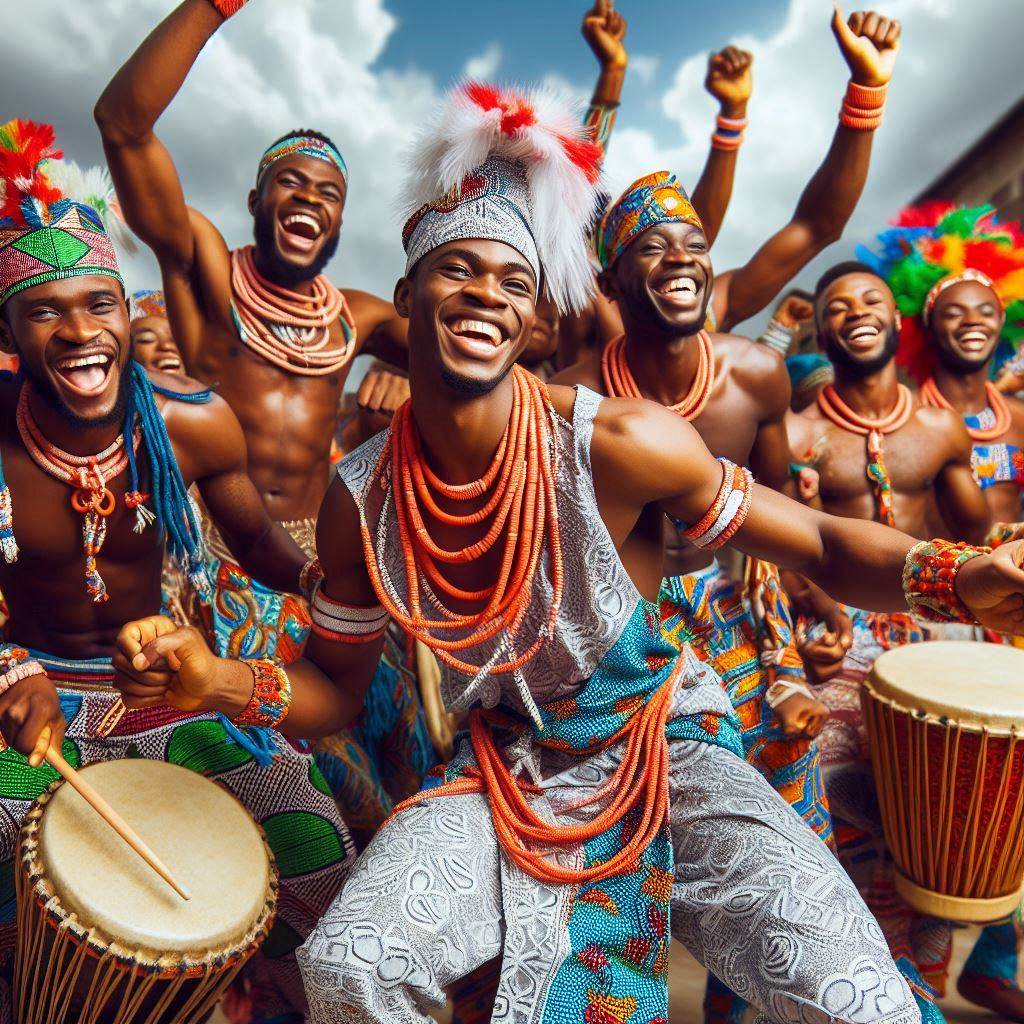
Delve into the Subject: Mass Communication Student Experiences in Nigeria
Uncover the Details: Career Opportunities in Mass Communication Nigeria
Discover More: Role of Technology in Learning Foreign Languages
Delve into the Subject: Must-Have Equipment for Nigerian Filmmakers
Uncover the Details: Exploring Nigerian Fashion Through Social Media
Costumes and music in traditional Nigerian dance
Nigeria, with its rich cultural heritage, boasts a plethora of traditional dance forms that captivate audiences worldwide.
From the vibrant beats of the drums to the elaborate costumes adorning the dancers,
each element contributes to the enchanting tapestry of Nigerian dance.
Costumes: A Visual Spectacle
Traditional Nigerian dance costumes are a visual feast, reflecting the diversity and splendor of the nation’s culture.
Adorned with colorful fabrics, intricate beadwork, and symbolic motifs,
these costumes serve not only as attire but also as a means of storytelling and cultural expression.
Variety of Costumes Across Dance Forms
Different dance forms in Nigeria are distinguished by their unique costumes and accessories.
For instance, the Yoruba gelede masquerade features ornate masks and flowing robes adorned with cowrie shells,
while the Igbo maiden dance showcases vibrant wrappers and coral beads that symbolize femininity and grace.
Music: The Heartbeat of Nigerian Dance
Central to traditional Nigerian dance is the rhythmic heartbeat of the music, provided by a variety of instruments such as drums, flutes, and rattles.
These instruments, often handmade using traditional methods,
create a pulsating rhythm that drives the movements of the dancers and engages the audience in the performance.
The Role of Drumming in Dance
Drumming holds a special significance in Nigerian dance, serving as both a musical accompaniment and a form of communication.
Each drumbeat conveys specific meanings and emotions, guiding the dancers through intricate choreography and facilitating cultural storytelling.
Enhancing the Dance Experience
Costumes and music work in harmony to enhance the overall experience of traditional Nigerian dance performances.
The vibrant colors and intricate designs of the costumes add visual splendor,
while the rhythmic music creates an immersive atmosphere that transports audiences to the heart of Nigerian culture.
Basically, traditional Nigerian dance is a cultural extravaganza that delights the senses and celebrates the rich heritage of the nation.
Through elaborate costumes and pulsating music, each performance tells a story of tradition,
identity, and community, leaving a lasting impression on all who witness its beauty.
Read: Impact of Christian Religious Studies on Nigerian Society
See Related Content: Popular Nigerian Comedy Shows and Comedians
Learn More: Role of Technology in Learning Foreign Languages
Learn More: Cultural Exchange Through Language Learning in Nigeria
Explore Further: Importance of Economics in Nigeria’s Education System
Contemporary relevance and future of traditional dance in Nigeria
Traditional dance forms in Nigeria hold a significant cultural and historical value,
showcasing the rich heritage of the diverse ethnic groups in the country.
These traditional dances are characterized by vibrant costumes,
rhythmic movements, and accompanying music that tell stories of the people’s traditions, beliefs, and way of life.
Contemporary relevance and future of traditional dance in Nigeria
Despite the influence of modernization and globalization on Nigerian society,
traditional dance forms remain a vital part of the cultural identity of the people.
These dances are not only performed during important ceremonies and celebrations but also in social gatherings and events,
serving as a means of entertainment and a way to connect with one’s roots.
Influence of modernization and globalization on traditional dance forms
The impact of modernization and globalization has led to the fusion of traditional dance elements with contemporary styles,
creating new and innovative forms of expression.
While some purists may argue that this dilutes the authenticity of traditional dances,
it also allows for the evolution and adaptation of these art forms to suit the changing times.
Efforts to promote and showcase traditional Nigerian dance on a global stage
- Several organizations and cultural institutions in Nigeria are actively involved in promoting and preserving traditional dance forms by organizing festivals, workshops, and performances both locally and internationally.
- These initiatives not only help to showcase the beauty and diversity of Nigerian dance to a global audience but also create opportunities for cultural exchange and collaboration with artists from different parts of the world.
- Through these efforts, traditional Nigerian dance is gaining recognition and appreciation on an international level, contributing to the country’s soft power and increasing its cultural influence globally.
Importance of preserving and celebrating traditional dance for future generations
- Preserving traditional dance forms is crucial for maintaining cultural continuity and ensuring that future generations have a connection to their heritage and identity.
- By celebrating traditional dances, young people can learn about their history, values, and traditions, fostering a sense of pride and belonging in their cultural heritage.
- Furthermore, traditional dance plays a significant role in promoting social cohesion and unity among diverse ethnic groups in Nigeria, fostering mutual understanding and respect for each other’s traditions.
- Therefore, it is essential to safeguard and pass down traditional dance forms to future generations as a way to preserve Nigeria’s cultural legacy and promote cultural diversity and inclusivity.
Overall, traditional dance forms in Nigeria are not just a form of entertainment but a means of preserving cultural heritage,
promoting social cohesion, and fostering a sense of community among its people.
Despite the challenges posed by modernization and globalization,
the future of traditional dance in Nigeria remains bright as efforts are being made to showcase these art forms on a global stage and ensure their preservation for generations to come.
Uncover the Details: Future of History & Strategic Studies in Nigeria
Conclusion
In summary, traditional dance forms in Nigeria hold immense cultural significance. They serve as a means of preserving the country’s rich heritage.
Through dance, stories, rituals, and traditions are passed down from generation to generation.
These dance forms are not merely entertainment but represent the collective identity and history of various ethnic groups in Nigeria.
Recap of the Significance
Traditional dance forms play a crucial role in Nigerian society. They are deeply ingrained in the cultural fabric and serve as a form of communication, celebration, and expression.
These dances embody the values, beliefs, and customs of the people.
They reflect the diversity and unity of Nigeria,
showcasing the unique traditions of each ethnic group while fostering a sense of belonging and pride among the populace.
Encouragement to Explore and Appreciate
It is essential for readers to explore and appreciate the rich cultural heritage of Nigerian traditional dance. By immersing themselves in these dance forms, they can gain a deeper understanding of the country’s history, traditions, and values.
Moreover, appreciating Nigerian traditional dance fosters cultural exchange and promotes mutual respect and understanding among different communities.
Call to Action
I urge readers to support initiatives that promote and preserve traditional dance in Nigeria. These initiatives play a vital role in safeguarding this cultural heritage for future generations.
By attending performances, participating in workshops, and advocating for the recognition of traditional dance,
individuals can contribute to its preservation and ensure that it continues to thrive in the modern world.
Let us all join hands in celebrating and preserving the beauty and significance of Nigerian traditional dance.
In closing, traditional dance forms in Nigeria hold immense cultural significance. They serve as a means of preserving the country’s rich heritage.
Through dance, stories, rituals, and traditions are passed down from generation to generation. These dance forms are not merely entertainment but represent the collective identity and history of various ethnic groups in Nigeria.

